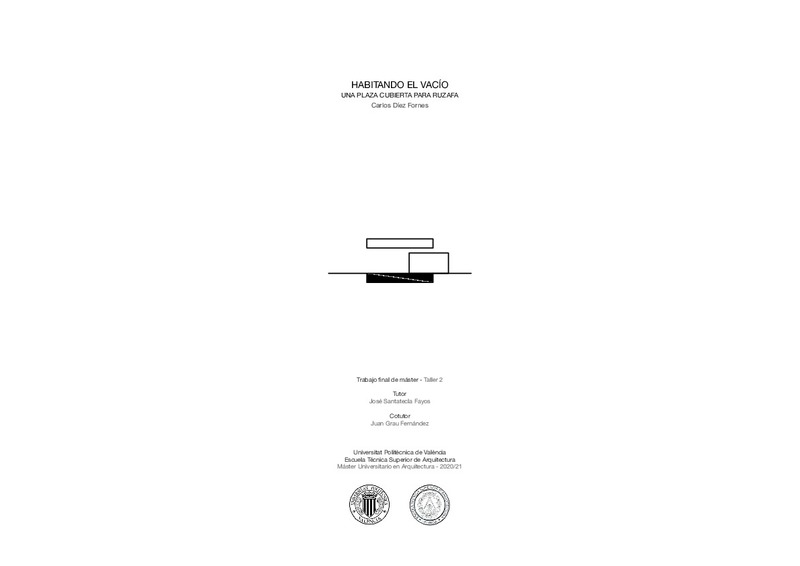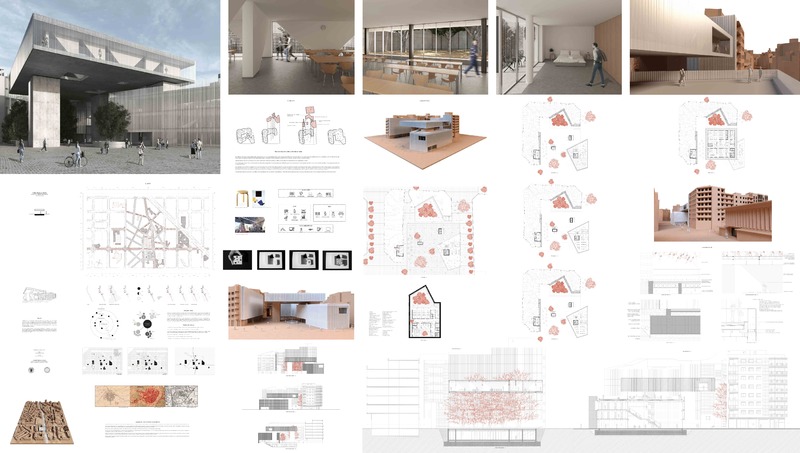JavaScript is disabled for your browser. Some features of this site may not work without it.
Buscar en RiuNet
Listar
Mi cuenta
Estadísticas
Ayuda RiuNet
Admin. UPV
Habitando el vacío. Una plaza cubierta para Ruzafa.
Mostrar el registro sencillo del ítem
Ficheros en el ítem
| dc.contributor.advisor | Santatecla Fayos, José
|
es_ES |
| dc.contributor.advisor | Grau Fernández, Juan
|
es_ES |
| dc.contributor.author | Díez Fornes, Carlos
|
es_ES |
| dc.coverage.spatial | east=-0.37069300621336065; north=39.46131763142423; name=Carrer Poeta al Russafi, 13, 46004 València, Valencia, Espanya | es_ES |
| dc.date.accessioned | 2022-01-19T14:19:00Z | |
| dc.date.available | 2022-01-19T14:19:00Z | |
| dc.date.created | 2021-09-28 | |
| dc.date.issued | 2022-01-19 | es_ES |
| dc.identifier.uri | http://hdl.handle.net/10251/179953 | |
| dc.description.abstract | [ES] Surgido de la descomposición de la manzana pérdida de Ruzafa se encuentra un vacío con vocación de espacio público. Con sus medianeras al descubierto, y rodeado por los patios de ventilación de los vecinos y edificios inhabitados, este espacio quiere ser: plaza, mercado, punto de reunión, espacio cultural, punto de encuentro de fiestas y ferias, a cubierto. Se regala al barrio un espacio de paso que respeta la domesticidad de los vecinos. Este vacío queda enmarcado por los planos de techo y de suelo a los cuales se les dota un cierto espesor, lo cual permite habitar el mundo aéreo y el mundo subterráneo, estando estos conectados por el Centro de Arte y Diseño, el cual queda configurado por las trazas preexistentes. | es_ES |
| dc.description.abstract | [EN] Emerged from the decomposition of the lost block of Ruzafa, there is a void with a vocation for public space. With its party walls uncovered and surrounded by the ventilation yards of the neighbours and unoccupied buildings, this space wants to be: a square, market, meeting point, cultural area, a meeting point for festivals and fairs, undercover. It is given to the neighbourhood as a passage space that respects the domesticity of the neighbours. This void is framed by the ceiling and floor planes, which given a specific thickness, will allow inhabiting the aerial and the underground world. This is connected by the Art and Design Center, configured by the pre-existing traces. | es_ES |
| dc.format.extent | 166 | es_ES |
| dc.language | Español | es_ES |
| dc.publisher | Universitat Politècnica de València | es_ES |
| dc.rights | Reserva de todos los derechos | es_ES |
| dc.subject | Valencia | es_ES |
| dc.subject | Ruzafa | es_ES |
| dc.subject | Espacio público | es_ES |
| dc.subject | Plaza cubierta | es_ES |
| dc.subject | Regeneración urbana | es_ES |
| dc.subject | Centro de Arte | es_ES |
| dc.subject | Vacío | es_ES |
| dc.subject | Centro histórico | es_ES |
| dc.subject | Interior de manzana | es_ES |
| dc.subject | Public space | es_ES |
| dc.subject | Covered square | es_ES |
| dc.subject | Urban regeneration | es_ES |
| dc.subject | Art Center | es_ES |
| dc.subject | Void | es_ES |
| dc.subject | Historical Center | es_ES |
| dc.subject | Interior block | es_ES |
| dc.subject.classification | PROYECTOS ARQUITECTONICOS | es_ES |
| dc.subject.other | Máster Universitario en Arquitectura-Màster Universitari en Arquitectura | es_ES |
| dc.title | Habitando el vacío. Una plaza cubierta para Ruzafa. | es_ES |
| dc.type | Tesis de máster | es_ES |
| dc.rights.accessRights | Abierto | es_ES |
| dc.description.bibliographicCitation | Díez Fornes, C. (2021). Habitando el vacío. Una plaza cubierta para Ruzafa. Universitat Politècnica de València. http://hdl.handle.net/10251/179953 | es_ES |
| dc.description.accrualMethod | TFGM | es_ES |
| dc.relation.pasarela | TFGM\143664 | es_ES |
Este ítem aparece en la(s) siguiente(s) colección(ones)
-
ETSA - Trabajos académicos [4687]
Escuela Técnica Superior de Arquitectura







